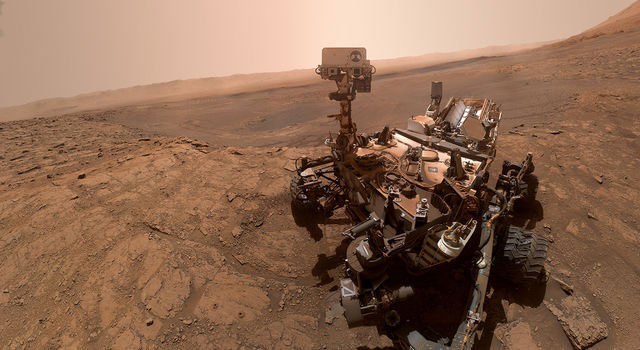NASA spacecraft discovered anomaly in oxygen on Mars
NASA's Curiosity spacecraft suddenly discovered an odd distribution of the amount of oxygen on Mars.
Curiousity has long yielded some noticeable results. After locating the amount of methane on Mars, studies from the location of this spacecraft in a crater have found changes that often occur to methane that cannot be explained by factors. environment that scientists have known. Now, in turn, the distribution of oxygen is listed as one of the planet's many other mysteries.

NASA's Curiousity expedition ship on the surface of Mars.(Photo: NASA).
The amount of oxygen on Mars represents 'an impressive seasonal and inter-season distribution , revealing a process of forming air layers or air surfaces that have not been determined on this planet', the authors wrote. The study was written in an article published on November 14 in the journal Geophysical Research.
Mars, like Earth, lies on its orbit. That means the northern and southern hemispheres of Mars go through seasons like the Earth: the summer when the hemisphere faces the Sun and the winter when away from the Sun. Scientists have used analysis samples of the Curiosity probe on Mars to track the abundance of different molecules in the planet's atmosphere, and how they change seasonally. Now, these data are published after 5 years of research on Earth (equivalent to 3 years on Mars).
'Curiousity's calculations of the amount of oxygen in the crater do not show their annual stability or seasonal characteristics, which are predicted based on known sources of Mars' atmosphere , ' The author writes: 'The actual amount of oxygen will be greater than expected in the northern Martian hemisphere in late spring to summer, and less in winter, while Curiousity figures are only collected. in the late fall and early winter. '
Scientists have tried to explain this. They checked the operation of the Curiousity, but did not find any problems.
"We are still trying to find a suitable explanation , " said Melissa Trainer, research author and planetary researcher at NASA's Goddard Aerospace Center. "The fact that the fluctuations in the oxygen flow on Mars cannot be repeated exactly every season makes us think that this problem is not related to atmospheric dynamics, but rather a weak, chemical source. some hidden factor that we can't explain ".
- NASA detected oxygen in the Martian atmosphere
- NASA intends to produce oxygen in the Martian atmosphere
- NASA's Maven spacecraft approached Mars
- NASA revealed seven devices used on Mars 2020
- NASA detects oxygen in the Martian atmosphere
- NASA tested the spacecraft to send people to Mars
- NASA spacecraft almost crashed into Mars's Moon
- The 7th grade student group discovered a mysterious cave on Mars
- NASA wants to produce fuel for spacecraft right on Mars
- US ambition to bring oxygen production to Mars
- NASA tested a UFO-like spacecraft
- Evidence of Mars contains enough oxygen to support life
- NASA intends to create oxygen in the Martian atmosphere
- How do people prepare to go to Mars?
 Announced 3 houses on the Moon and Mars
Announced 3 houses on the Moon and Mars Science proves: Mars also knows 'deflated'
Science proves: Mars also knows 'deflated' Elon Musk announced the price for a Mars trip was 11.6 billion VND, free of charge
Elon Musk announced the price for a Mars trip was 11.6 billion VND, free of charge NASA discovered strange 'gate' on Mars, is the hiding place found?
NASA discovered strange 'gate' on Mars, is the hiding place found? Was there nuclear war in ancient times?
Was there nuclear war in ancient times?  What happens to dead bodies on Mars?
What happens to dead bodies on Mars?  Watch NASA probe 'capture' Martian sandstorm
Watch NASA probe 'capture' Martian sandstorm  First photo of Mars' strangely shaped moon
First photo of Mars' strangely shaped moon  What makes Mars different from Earth
What makes Mars different from Earth  How will humans build on Mars?
How will humans build on Mars? 